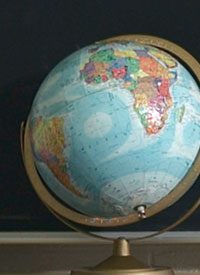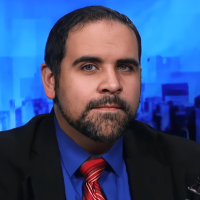
“Are you a citizen of the United States or are you a citizen of the world?” Professor and Ambassador Ahmad Kamal, a retired career diplomat from Pakistan, asked students sitting in the second week of their diplomacy seminar, in my freshman year of college, in the fall of 2007. The entire class of intimidated college freshmen and sophomores raised their hands for “citizen of the world,” including this author. I was an undergraduate college student majoring in diplomacy and international relations, and from that moment on, I became aware of the extent of the leftist lean in this field.
My immediate fears that my field swung in a leftist or a globalist orbit have been vindicated through my observations in the various courses and classes required of this area of study. It is a field in which nearly every professor applauds President Woodrow Wilson as one of the greatest men and visionaries of the 20th century, serving as the prime role model for diplomacy students. Books such as Wilson’s War: How Woodrow Wilson’s Great Blunder Led to Hitler, Lenin, Stalin, and World War II, by Jim Powell, are not required reading — not even as a pretense so that professors can pretend to present a comprehensive look at the topic. Instead, students are presented President Wilson and his League of Nations on a pedestal.
Students are taught to believe that the League of Nations was the pinnacle of man’s aspiration and idealism for a world order based on peace and the rule of law. The League is presented as an almost perfect institution, whose main failure resided in that it was “too weak,” lacking the sufficient police powers of enforcement and coercion. In essence the main criticism taught about the League is that it was not powerful enough and all encompassing.
A student could ask, “If Woodrow Wilson and the League of Nations were truly great, as the study of diplomacy makes them out to be, then why did the United States not join the League?” but a thorough answer would not be forthcoming. It is in such areas that detail is lacking, with textbooks usually stating nothing further than it was just rejected by the Congress or Senate, offering no explanation as to why, and then moving on to the next point. Never does the student learn the answer, for if he did know, and fully understand, then he might begin to question the entire curriculum of the field as it is currently taught across the country.
Students lack an adequate study of American non-intervention (negatively dubbed “isolationism” in classes). A proper educational foundation, based on the core principles of neutrality and non-entanglement, as advocated by Presidents from George Washington to Grover Cleveland, is absent.
Students of diplomacy would not be able to recognize the words spoken by U.S. President Grover Cleveland in his first inaugural address on March 4, 1885. Here, in a one-paragraph quote, Cleveland outlines the traditional American foreign policy, a foreign policy now forgotten and sadly brushed aside:
The genius of our institutions, the needs of our people in their home life, and the attention which is demanded for the settlement and development of the resources of our vast territory dictate the scrupulous avoidance of any departure from that foreign policy commended by the history, the traditions, and the prosperity of our Republic. It is the policy of independence, favored by our position and defended by our known love of justice and by our power. It is the policy of peace suitable to our interests. It is the policy of neutrality, rejecting any share in foreign broils and ambitions upon other continents and repelling their intrusion here. It is the policy of Monroe and of Washington and Jefferson — “Peace, commerce, and honest friendship with all nations; entangling alliance with none.”
This Washingtonian or Jeffersonian foreign policy, exhibited best and last by President Cleveland, has been replaced with the progressive idealism of “Wilsonianism” — the principal ideology that has guided every U.S. President and State Department foreign policy, from the administration of Franklin Roosevelt to George W. Bush and Barack Obama today.
Wilsonian foreign policy is one rooted in globalist ideals, placing great emphasis and reliance on international institutions as the means toward world peace (i.e., the League of Nations or the United Nations). It is a break from the traditional American foreign policy, which was rooted in “independence … [and] suitable to our interests,” as defined by President Cleveland.
The students of diplomacy and international affairs are not educated in American history to any extent at all: no mention of the XYZ affair, in which the French demanded millions in loans and bribes before they would stop seizing American ships; no mention of President George Washington’s Proclamation of Neutrality (1793); no mention of Washington’s Farewell Address (1796), in which he warned about the consequences of becoming entangled in the interests of other nations: “Sympathy for the favorite nation, facilitating the illusion of an imaginary common interest in cases where no real common interest exists, and infusing into one the enmities of the other, betrays the former into a participation in the quarrels and wars of the latter without adequate inducement or justification”; and no study or mention of the Monroe Doctrine and its significance.
The old 1648 Westphanian notions, which gave rise to the concept of national sovereignty, are brushed aside as antiquated and incompatible to the new globalized world. The national interest has been replaced by the global interest in the teaching of diplomacy and foreign affairs. Students of diplomacy are thus void of any sense of loyalty or patriotism to their country, viewing nationalism with animosity and as a characteristic applicable only to war.
“Are you a citizen of the United States or are you a citizen of the world?” remains the question, and it is obvious which answer the student of diplomacy is molded to follow. One’s allegiance rests not in the government of a single state or country, but rather in the government of the world.
A one-world government, which would fall under the Wilsonian school of thought, is exactly what the League was originally meant to be, and it was correctly classified by the media at the time of its inception: “world government.” In college studies of diplomacy, the United Nations is viewed as a living institution or organization that grows at the same rate as new challenges and dilemmas confront it. Therefore, with each new issue that arises, new power is created and delegated to the benefit of the United Nations.
The UN’s growth can best be measured by the rate of globalization and integration since 1945; as the world continues to go down the path of globalization and socio-economic integration, so too goes the UN down the path of increased global regimentation. At least that section of the courses is accurate. But students are taught to accept globalization as an unstoppable reality, in which the delegated powers of state governments continue to integrate under a progressively strengthening United Nations — until we will have nothing less than a one-world government, where the UN Charter supplants the U.S. Constitution as the law of the land and where the UN Declaration of Human Rights, with its acceptance of “second generation” socialist rights and its neglect of property rights, is viewed as the main document mandating what needs, goods, or services the national government is obligated to provide to its citizens.
One-world Security, or Socialism?
This is where the study of “Human Security” comes in to play. In 1979, Kenneth Waltz, a neo-realist scholar of international relations, defined Human Security as being the sum of “Human Rights” plus “State Security.” Human Security is a key facet to the study of diplomacy and international affairs today. According to the majority of international relations textbooks used today, the Human Security approach has come to replace international Marxism as a dominant goal in diplomacy studies. One of the main textbooks on this approach used by schools of diplomacy today is Human Security: Concepts and Implications (2007) by Shahrbanou Tadjbakhsh and Anuradha M. Chenoy.
Tadjbakhsh and Chenoy define the role of the state, as it relates to human security, as to provide for the legal framework to ensure the empowerment of the means to address the people’s security in accordance with President Franklin Delano Roosevelt’s terminology of “freedom from fear” and “freedom from want” — meaning socialism. Tadjbakhsh and Chenoy’s textbook further elaborates on this point: “In the concept of ‘freedom from want,’ the state guarantees basic social justice which is, in some states, institutionalized in a welfare state model with a complex system of redistribution.” (Emphasis added.)
A “welfare state model with a complex system of redistribution” sounds an awfully lot like the Marxist approach that it supposedly replaced. The authors further elaborate and explain that human security “focuses on two pillars” that comprise the “proper functions” of state governments: the first being the responsibility to protect its citizens through the maintenance of “collective security” (i.e., a system of permanent foreign alliances, such as a NATO, SEATO, Warsaw Pact, or League of Nations), and the second “proper function” being “a responsibility to provide, through effective engagement and aid.”
With regards to the second pillar, two of the most severe threats to human security that students are taught to acknowledge are threats to “economic security” and “food security.” Economic security is defined as an assured basic income; threats to it include unemployment, temporary work, precarious employment, self-employment, and low and insecure income. Food security refers to the physical and economic access to basic food, threats to which include poor distribution and the lack of purchasing power.
Furthermore, these issues carry a great deal of significance since it is taught that these human security threats constitute issues of “human rights,” particularly “social and economic rights.” Students are also taught to believe that Marxism, which is defined as a political theory based on class struggle, has been outmoded, and that the centralization of power in the hands of the government in order to reallocate resources and redistribute the wealth is a new idea that must be accepted and advanced, on both the national and international levels.
Apparently associating the unpopularity of communism with the end of the Cold War, the textbooks and diplomacy scholars have redefined the terminology of traditional security issues to fit into their communist worldview. Each plank of Marxist ideology is retained, but redefined, as the answer to some sort of security threat (i.e., economic security, food security, housing security, etc.), promoting communism under the guise of “human security.”
A state that does not abide by these functions is viewed as posing a threat to human security, calling for action by the international community — referring of course to the United Nations. The United States as created by the Founding Fathers — an entity of limited government, based on the concept of protecting basic rights, and fully independent, free of foreign entanglements — would henceforth constitute a human security threat by today’s standards as taught in our universities.
One may contend that the U.S. government does not have to abide by human security’s “proper functions” because of national sovereignty; however, diplomacy students are taught otherwise. Proponents of human security argue that “state responsibility” supersedes traditional “state sovereignty,” creating a new definition for sovereignty.
Selling Out Sovereignty
The new definition of sovereignty comes from the 2001 report Responsibility to Protect (RTPR), authorized by the Canadian government’s International Commission on Intervention and State Sovereignty, which was accepted by the United Nations at the World Summit in 2005. According to Tadjbakhsh and Chenoy, RTPR promotes the idea that “sovereignty for a state should mean protection of its population, and if for some reason it cannot or will not work, the international community has the residual responsibility to intervene.” In order for a state’s sovereignty to be legitimate it must conform to the communist doctrine of “state responsibility” to act as a provider, assuring that the threats to economic and food security are fully addressed.
If a state fails to meet these expectations, such as the aforementioned colonial United States, then it loses its legitimate claim to sovereignty in the eyes of the international community, inviting to itself global intervention.
The implementation of the Democratic Peace Theory (DPT) and “spreading democracy” are presented as the surest ways to bring about world peace and security. The main, fundamental thesis of DPT is that if the world were a democracy then there would be no more wars or other security threats. (This is posited though it flies in the face of the beliefs of America’s Founders — who were well-educated in the history of democracies’ failures. Likewise, John Birch Society founder Robert Welch noted that political democracies centralize “governmental power in a simple majority” and disenfranchise many, breeding hostility.)
The objective, then, according to professors, is not to answer whether or not we should be intervening around the world installing democracies, but how we should go about doing it — either through “hard power” (i.e., military intervention and coercion) or “soft power,” which is what human security relies on. Regime change and intervention are not questioned; they are accepted. The only question to students is how best can we go about regime change and intervention in accordance with DPT. It should be noted that as far as DPT is considered, the governments of Russia, India, Brazil, and Venezuela meet the criteria of democracies, thus those governments are fine and more governments like them would be acceptable.
What would happen if the national government of every country around the world became a democracy? That’s never asked or addressed, but the natural order would, of course, be the formation of an international or global confederation — much like our Articles of Confederation, but on the global level, as the starting point or framework for a one-world government. And much like the history of our federal government, a world federal government would steadily evolve from a limited framework to a vast, bureaucratic, all-powerful centralized government, which just so happens to be the main goal of the World Federalist Movement (WFM), whose membership includes professors of international relations.
In fact, the WFM is so committed to the idea of a one-world government that they would even forgo the need for all states to have to be liberal democracies, as originally suggested by Clarence Streit, an early advocate of world government, in his 1938 book Union Now. The WFM admitted its approval of a world government composed of non-democratic states, such as a Communist China, for example, in an article published by its senior vice-president, professor emeritus of political science at Villanova University John Logue. Professor Logue’s article “A Strategy for Achieving a United Nations World Federation,” published in 1990, states:
For forty-one years the World Federalist Movement (WFM) has carefully — and wisely — avoided endorsing the Streit position. This refusal reflects WFM’s judgment that in any near future many nations will continue to have authoritarian regimes and that a U.N. world federation made up of both democratic and authoritarian members, each accepting enforceable world law, would be better than a weak United Nations.
Despite his perception of the current UN being “weak,” he goes on to further make the case for world government using the existing institutions: “World federalists are — and should seem to be — the best friends the United Nations has…. World federalists must not only talk about and work for the restructured United Nations they hope to see. They must also help the existing United Nations do as good a job as it can.” Working with the United Nations in support of it, Professor Logue and other one-worlders, such as those that are instrumental in the teaching of diplomacy today, seek to gradually strengthen the UN in order to mold the thinking of students to accepting world government without calling it as such. “Not Global Government but Global Governance,” a professor told me after I brought up the issue of one-world government; but if the thinking is already to accept the institutions of global governance, then what is there to prevent the acceptance of a global government?
Global Gurus
In addition to textbooks, students are encouraged to read literature propagated by establishment insiders — the New York Times, Financial Times, Economist magazine, and, most of all, Foreign Affairs magazine, which is the bimonthly journal published by the Council on Foreign Relations (CFR). More often than not, an article from Foreign Affairs will be the required reading in a diplomacy course. An internship with the CFR is highly sought after by diplomacy students, especially when their professor happens to be a member and speaks with exuberance of his meeting at the CFR, discussing global health issues in the presence of David Rockefeller and other establishment elites.
Students are told that the CFR is nothing more than a foreign policy study group. They do not know its origins in 1921 with Colonel Edward Mandel House — an internationalist who spearheaded the League of Nations and who, as chief advisor and right-hand man to President Wilson, encouraged President Wilson to sign the Federal Reserve Act of 1913 into law, which not only centralized banking in the United States but empowered internationalist, elite bankers. Students are also unaware of the current beliefs espoused by its president, Richard Haass, who in an op-ed article, dated February 17, 2006, entitled “Sovereignty and Globalisation” wrote, “States must be prepared to cede some sovereignty to world bodies if the international system is to function.” Haass further went on to state that “the goal should be to redefine sovereignty for the era of globalisation, to find a balance between a world of fully sovereign states and an international system of either world government or anarchy.”
Haass makes it clear that the choice is between world government and anarchy, and this is exactly how international affairs are presented and taught to students. The current condition of the international system is referred to in negative terminology as an “anarchic system,” or it is said that “the international system is anarchic.” The lack of global or world order is the main problem in the globalized world, is what students in this field are essentially taught. What solution is offered to this problem? Simple: Bring order to chaos — establish the rule of law where there was none before (i.e., international government to replace international anarchy).
Whether one is learning about the League of Nations, the United Nations, the European Union, the African Union, the World Trade Organization, the International Monetary Fund, institutions of international law, international terrorism, human rights, second-generation rights, human security, economic security, food security, health security, or environmental security, all of the roads lead to one path — the centralization of power on the international level, which is socialism and one-world government.
This is what the diplomats of tomorrow are being taught.




